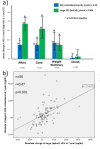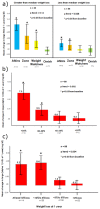The improvement of large High-Density Lipoprotein (HDL) particle levels, and presumably HDL metabolism, depend on effects of low-carbohydrate diet and weight loss
- PMID: 27103896
- PMCID: PMC4834750
- DOI: 10.17179/excli2015-642
The improvement of large High-Density Lipoprotein (HDL) particle levels, and presumably HDL metabolism, depend on effects of low-carbohydrate diet and weight loss
Retraction in
-
Retraction: The improvement of large High-Density Lipoprotein (HDL) particle levels, and presumably HDL metabolism, depend on effects of low-carbohydrate diet and weight loss.EXCLI J. 2016 Sep 19;15:570. doi: 10.17179/excli2016-570. eCollection 2016. EXCLI J. 2016. PMID: 27932940 Free PMC article.
Abstract
Depressed levels of atheroprotective large HDL particles are common in obesity and cardiovascular disease (CVD). Increases in large HDL particles are favourably associated with reduced CVD event risk and coronary plaque burden. The objective of the study is to compare the effectiveness of low-carbohydrate diets and weight loss for increasing blood levels of large HDL particles at 1 year. This study was performed by screening for body mass index (BMI) and metabolic syndrome in 160 consecutive subjects referred to our out-patient Metabolic Unit in South Italy. We administered dietary advice to four small groups rather than individually. A single team comprised of a dietitian and physician administered diet-specific advice to each group. Large HDL particles at baseline and 1 year were measured using two-dimensional gel electrophoresis. Dietary intake was assessed via 3-day diet records. Although 1-year weight loss did not differ between diet groups (mean 4.4 %), increases in large HDL particles paralleled the degree of carbohydrate restriction across the four diets (p<0.001 for trend). Regression analysis indicated that magnitude of carbohydrate restriction (percentage of calories as carbohydrate at 1 year) and weight loss were each independent predictors of 1-year increases in large HDL concentration. Changes in HDL cholesterol concentration were modestly correlated with changes in large HDL particle concentration (r=0.47, p=.001). In conclusion, reduction of excess dietary carbohydrate and body weight improved large HDL levels. Comparison trials with cardiovascular outcomes are needed to more fully evaluate these findings.
Keywords: HDL; low carbohydrate diet and weight loss; obesity.
Figures





References
-
- Asztalos BF, Collins D, Cupples LA, Demissie S, Horvath KV, Bloomfield HE, et al. Value of high-density lipoprotein (HDL) subpopulations in predicting recurrent cardiovascular events in the Veterans Affairs HDL Intervention Trial. Arterioscler Thromb Vasc Biol. 2005;25:2185–2191. - PubMed
-
- Barzilai N, Atzmon G, Schechter C, Schaefer EJ, Cupples AL, Lipton R, et al. Unique lipoprotein phenotype and genotype associated with exceptional longevity. JAMA. 2003;290:2030–2040. - PubMed
-
- Dansinger ML, Gleason JA, Griffith JL, Selker HP, Schaefer EJ. Comparison of the Atkins, Ornish, Weight Watchers, and Zone diets for weight loss and heart disease risk reduction: a randomized trial. JAMA. 2005;293:43–53. - PubMed
Publication types
LinkOut - more resources
Full Text Sources
